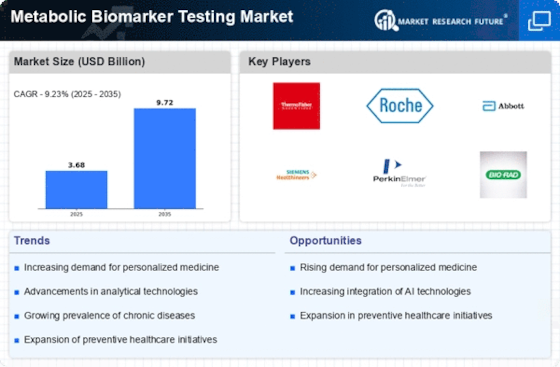Market Analysis
In-depth Analysis of Metabolic Biomarker Testing Market Industry Landscape
Metabolic biomarker testing involves the analysis of biomarkers in biological samples to assess metabolic function and detect abnormalities associated with various metabolic disorders such as diabetes, obesity, and cardiovascular disease. This market encompasses a range of diagnostic tests, laboratory equipment, and consumables used in metabolic biomarker analysis.
The global metabolic biomarker testing market has experienced significant growth in recent years, driven by factors such as the increasing prevalence of metabolic disorders, growing demand for personalized medicine, and advancements in biomarker discovery and analysis technologies. Projections indicate continued growth as metabolic disorders remain a major public health concern worldwide. The rising prevalence of metabolic disorders, including diabetes, obesity, and metabolic syndrome, is a primary driver of market dynamics in the metabolic biomarker testing market. As these conditions become more prevalent globally, the demand for accurate and reliable biomarker testing solutions increases, driving market growth. Technological advancements in biomarker discovery, assay development, and analytical instrumentation have revolutionized metabolic biomarker testing. Innovations such as high-throughput screening platforms, multiplex assay systems, and mass spectrometry-based techniques enable researchers and healthcare providers to analyze biomarkers with greater precision, sensitivity, and efficiency, driving market growth and improving diagnostic accuracy.
Metabolic biomarker testing finds applications in various diagnostic settings, including clinical laboratories, research institutions, and point-of-care settings. Biomarker tests are used for disease screening, diagnosis, prognosis, treatment monitoring, and risk stratification, shaping market dynamics by driving demand for specialized testing solutions tailored to specific clinical needs. Regulatory requirements and approvals impact market dynamics by influencing product development, manufacturing standards, and market access. Compliance with regulations such as FDA approval in the United States and CE marking in Europe is essential for diagnostic test manufacturers to commercialize their products and enter new markets.
Healthcare expenditure and reimbursement policies influence market dynamics by affecting patient access to metabolic biomarker testing services. Adequate insurance coverage and reimbursement rates contribute to market growth by reducing financial barriers to testing and promoting routine screening and monitoring for metabolic disorders. Precision medicine initiatives drive market dynamics by emphasizing the importance of biomarker-based diagnostics for personalized disease management and treatment optimization. Biomarker testing enables healthcare providers to identify patients at risk for metabolic disorders, tailor treatment plans based on individual biomarker profiles, and monitor treatment response over time, leading to improved patient outcomes and cost-effective healthcare delivery.
Ongoing research and development efforts in biomarker discovery and validation fuel market growth by expanding the portfolio of biomarker-based tests available for metabolic disorder diagnosis and management. Collaborative research initiatives, academic-industry partnerships, and government funding support innovative biomarker research projects, driving technological innovation and market expansion. The metabolic biomarker testing market is competitive, with diagnostic test manufacturers, biotechnology companies, and clinical laboratories vying for market share through product innovation, pricing strategies, and marketing initiatives. Companies invest in research and development, clinical validation studies, and commercialization efforts to differentiate their products and gain a competitive edge in the market. Globalization trends contribute to market expansion by creating opportunities for international collaboration, market entry, and distribution partnerships. Diagnostic test manufacturers seek to expand their geographic footprint, enter new markets, and leverage economies of scale to drive growth within the global metabolic biomarker testing market. Access to affordable metabolic biomarker testing is essential for early disease detection, intervention, and prevention, particularly in underserved regions with limited access to healthcare resources. Initiatives to improve healthcare infrastructure, increase testing accessibility, and reduce testing costs contribute to market growth and ensure equitable access to essential metabolic biomarker testing services.


















Leave a Comment